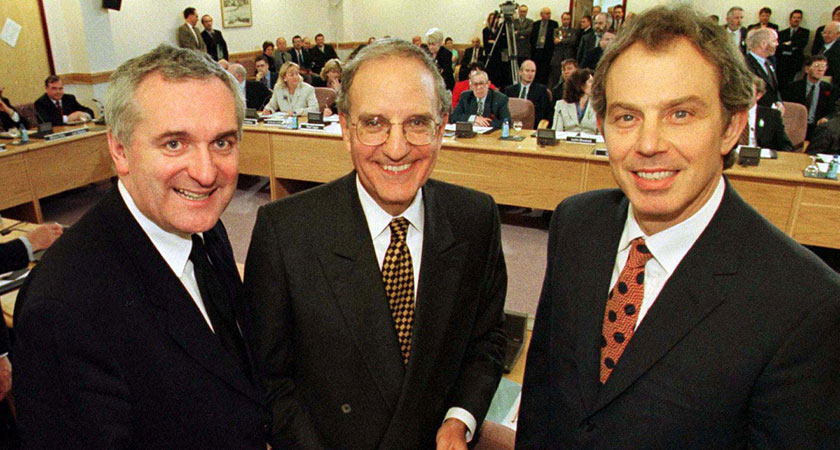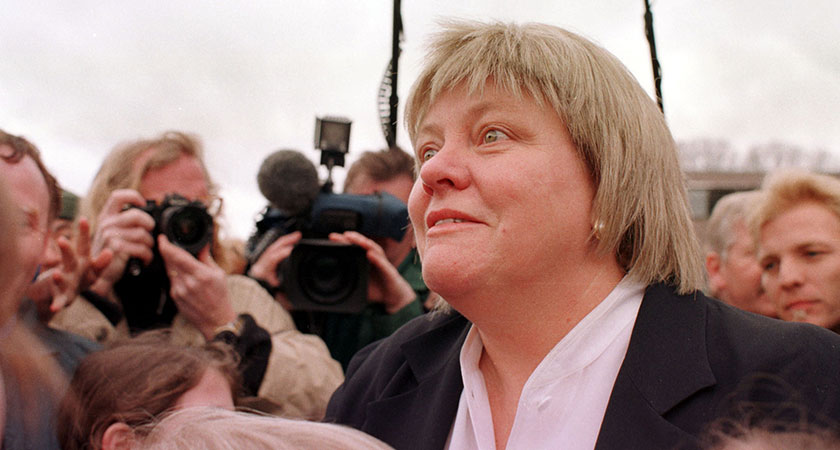POLITICIANS have today been marking 24 years since the Good Friday Agreement was signed on April 10, 1998.
The accord, also known as the Belfast Agreement, helped bring an end to the Troubles and laid the foundation for power sharing in Northern Ireland.
It also set out the framework for greater cooperation between the governments of Ireland and Northern Ireland and the continued consultation between the British and Irish governments.
The Agreement was signed on Good Friday, 1998, after talks chaired by United States special envoy George Mitchell and overseen by Secretary of State Mo Mowlam.
Bertie Ahern of Fianna Fáil was Taoiseach at the time, while Tony Blair was British Prime Minister.
 US Senator George Mitchell (centre) who chaired the all-party talks that helped lead to the Agreement, with Bertie Ahern and Tony Blair on Good Friday, 1998 (Image: RollingNews.ie)
US Senator George Mitchell (centre) who chaired the all-party talks that helped lead to the Agreement, with Bertie Ahern and Tony Blair on Good Friday, 1998 (Image: RollingNews.ie)Commenting on the anniversary, both Taoiseach Micheál Martin and Foreign Affairs minister Simon Coveney stressed the importance of the milestone against the backdrop of the conflict in the Ukraine,
In a statement, the Taoiseach said the war in Ukraine was 'a stark reminder that we cannot take democracy and peace for granted'.
"We have been united on the island of Ireland in our revulsion at Russian aggression and in our support and solidarity for the people of Ukraine," he said.
"It is incumbent on us all to protect and nurture the Good Friday Agreement which marked a seismic milestone in the lifetime of this island.
"It signalled a new beginning underpinned by peace and mutual respect — grounded in the principles of consent, democratic institutions, reconciliation and cooperation."
 Secretary of State Mo Mowlam heading into the final round of talks the day before the Agreement was signed (Image: Eamonn Farrell/RollingNews.ie)
Secretary of State Mo Mowlam heading into the final round of talks the day before the Agreement was signed (Image: Eamonn Farrell/RollingNews.ie)Meanwhile, Coveney added: "As the world watches continuing horrors unfold in Ukraine, this anniversary reminds us of how far we have come, how profoundly precious peace is and of the power of democracy."
The Agreement was approved by voters in two referenda held on the island of Ireland on May 22, 1998.
Coveney added that the Agreement fostered increased trust between both communities in Northern Ireland and despite facing challenges, it 'remains the guiding light for a brighter future'.
"I am acutely conscious that there are communities that feel that they have not benefited from the Peace Process,” said Coveney.
"I want to reaffirm the Irish Government's commitment to work in partnership with politicians and all communities in Northern Ireland, and with the British Government to address these concerns.
"We have challenges ahead and solving these challenges can be frustrating.
"However, as the Agreement has shown us, it is only through collective, democratic action that we can find a way forward."
'Victory for the peacemakers'
The Northern Ireland Assembly was created as a result of the Good Friday Agreement.
Ahead of the Assembly Elections next month following a turbulent few years for Stormont, SDLP Deputy Leader Nichola Mallon cited the Agreement in highlighting what democracy can achieve.
"Too often too many of us believe that change here isn't possible, with some people so fed up they're considering not voting," she posted on Twitter.
"When you are fed up, is exactly the time you should be voting.
"Change was possible 24 years ago. It's possible again but you have to vote for it."
Today is the 24th anniversary of the signing of the Good Friday Agreement, which ended decades of violence, and opened up the possibility of reconciliation – which we continue to strive to fulfil today.
Read the full text of the Good Friday Agreement 👉https://t.co/3tpOaU4w8l pic.twitter.com/3UUmi9mC70
— Embassy of Ireland (@IrelandEmbGB) April 10, 2022
The SDLP, led by John Hume, was one of the main political parties to the Agreement.
Current party leader Colum Eastwood said it was important to continue the work of his predecessors.
"The Good Friday Agreement was a victory for the peacemakers and an offer of hope to my generation," he said.
"24 years on we have yet to live up to its full potential but we have to keep trying."
Reflection and realities
Sinn Féin was one of the parties that backed the Agreement, with only the DUP opposing the accord.
The party's vice president and former Deputy First Minister of Northern Ireland, Michelle O'Neill, said today that the Agreement showed what can be achieved when parties work together.
"The Good Friday Agreement is the basis for deepening peace, political stability and reconciliation on the island of Ireland, and between Ireland and Britain," she said.
"This anniversary allows us an opportunity to reflect upon how far we have come, the journey of transformation that we have all travelled.
"And assess the present realities that still face our society in 2022, like Brexit and protecting Ireland's future beyond it, and the need to deal with the outstanding challenges that remain."
'Unprecedented decades of peace'
British Prime Minister Boris Johnson said the signing of the Agreement was a 'momentous moment for peace' that transformed Northern Ireland into a 'thriving and dynamic part of the UK'.
He added: "24 years on this progress cannot be underestimated or undermined."
Meanwhile, Labour leader Keir Starmer reiterated his support for the Agreement, saying: "The Good Friday Agreement has brought us unprecedented decades of peace and prosperity.
"As we mark 24 years since its signing let us ensure this remarkable achievement of diplomacy and compromise remains the framework we build our shared future upon."
Today we celebrate the 24th anniversary of the signing of the Good Friday Agreement. Since 1998 the 310-mile border in Ireland has remained frictionless & invisible. As a guarantor of this historic peace accord, we must ensure this blueprint for lasting peace & stability remains.
— Rep. Richard Neal (@RepRichardNeal) April 10, 2022
However, some have claimed the NI Protocol — part of the Brexit withdrawal agreement, which means goods arriving from Britain are checked at Northern Irish ports — has undermined the Agreement.
Former Labour MP Kate Hoey, herself from Northern Ireland, tweeted today that 'the Protocol has destroyed the Belfast Agreement'.
“No consent and it divides NI from rest of the U.K,” she added.
“Every day some new obstruction to trade appears.
“Belfast Agreement not a bedrock and instability grows.”

